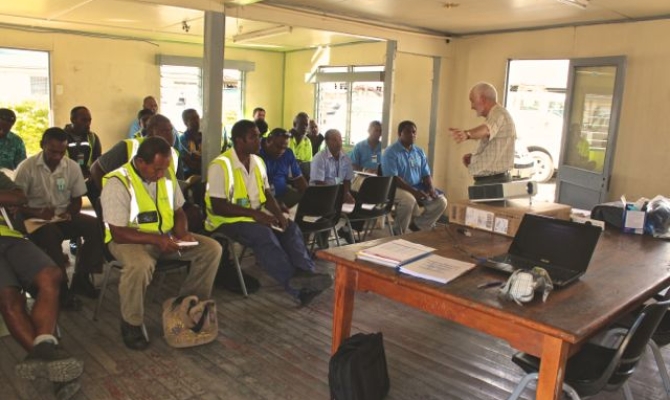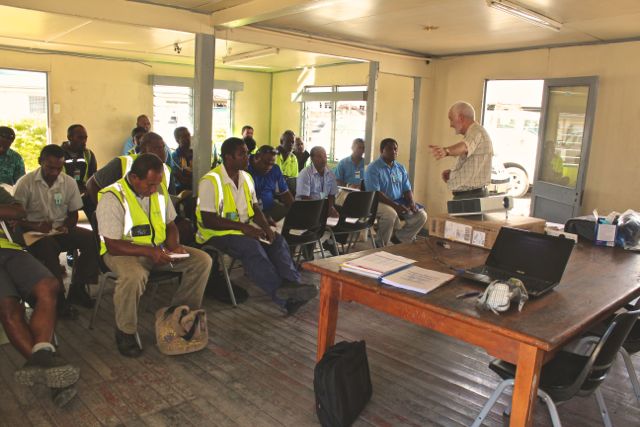
Waste Management and Pollution Control
The PacWaste Pacific hazardous waste management project completed asbestos management training of more than 60 Fiji Water Authority personnel in four training sessions held in Lautoka and Suva this month. Fiji Water Authority staff are responsible for managing more than 40,000 km of asbestos cement water pipe across the Fiji Islands.

The four year (2013-2017), €7.85 million European Union (EU) and Secretariat of the Pacific Regional Environmental Programme (SPREP) partnered PacWaste project, recently completed a regional asbestos survey which identified asbestos cement water pipe management and disposal as a serious and common problem across many of the Pacific Island nations. The World Health Organization (WHO) has also identified occupational exposure to asbestos as the most significant single cause of cancer in the workplace.
"There is a specific occupational health and safety risk for Fiji Water Authority workers who need to access, repair and remove the asbestos cement pipes," said Mr. Gary Rhyder, PacWaste Technical Advisory Panel Asbestos Expert.
"Workers are put at risk when they break or cut the asbestos cement pipes incorrectly, which can release airborne asbestos particles that can be breathed into the lung resulting in lung diseases such as asbestosis and cancers including mesothelioma."
"There are well developed, and simple systems already followed in Australia and New Zealand which have been introduced to participants in the PacWaste asbestos training session which can easily reduce the risk to workers to almost zero. The training is part of overall capacity building efforts under the project, which is fundamental in consolidating skills and sustaining project results," said Ms Ileana Miritescu, Programme Manager, Natural Resources and Infrastructure Section at the European Union Delegation for the Pacific in Suva.
Specific training and provision of high quality personal protective equipment is essential to safeguard workers and to prevent them from taking asbestos fibres home with them on their clothes where their families could also become exposed to airborne asbestos fibres.
This is just the very beginning of a series of asbestos management training, awareness raising and policy improvement which the PacWaste project will roll out over the next 18 months as part of overall prioritised asbestos management actions in 13 Pacific Island nations," said the PacWaste Manager, Mr Stewart Williams.
For more information on the PacWaste project please visit www.sprep.org/pacwaste

Asbestos Training at Fiji Water Authority in Lautoka, Fiji. Photo - Amol Lal
The four year (2013-2017), €7.85 million European Union (EU) and Secretariat of the Pacific Regional Environmental Programme (SPREP) partnered PacWaste project, recently completed a regional asbestos survey which identified asbestos cement water pipe management and disposal as a serious and common problem across many of the Pacific Island nations. The World Health Organization (WHO) has also identified occupational exposure to asbestos as the most significant single cause of cancer in the workplace.
"There is a specific occupational health and safety risk for Fiji Water Authority workers who need to access, repair and remove the asbestos cement pipes," said Mr. Gary Rhyder, PacWaste Technical Advisory Panel Asbestos Expert.
"Workers are put at risk when they break or cut the asbestos cement pipes incorrectly, which can release airborne asbestos particles that can be breathed into the lung resulting in lung diseases such as asbestosis and cancers including mesothelioma."
"There are well developed, and simple systems already followed in Australia and New Zealand which have been introduced to participants in the PacWaste asbestos training session which can easily reduce the risk to workers to almost zero. The training is part of overall capacity building efforts under the project, which is fundamental in consolidating skills and sustaining project results," said Ms Ileana Miritescu, Programme Manager, Natural Resources and Infrastructure Section at the European Union Delegation for the Pacific in Suva.
Specific training and provision of high quality personal protective equipment is essential to safeguard workers and to prevent them from taking asbestos fibres home with them on their clothes where their families could also become exposed to airborne asbestos fibres.
This is just the very beginning of a series of asbestos management training, awareness raising and policy improvement which the PacWaste project will roll out over the next 18 months as part of overall prioritised asbestos management actions in 13 Pacific Island nations," said the PacWaste Manager, Mr Stewart Williams.
For more information on the PacWaste project please visit www.sprep.org/pacwaste